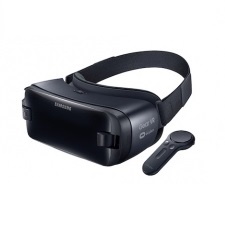Samsung has confirmed that it is working on a standalone headset for VR. The news was revealed by Executive Vice President, Lee Young-hee, ahead of the Korean manufacturer’s recent reveal of its new Galaxy S8 mobile handsets.
Democratising Demand
According to CNET, Lee is quoted as saying that the company has two ‘tracks’ for VR; “First of all, let's democratise this new demand [and] make it part of our smartphone experience."
With 5,000,000 Gear VR users already, Samsung is well on the way to establishing this democracy. The next step on this track will be the release of Samsung’s updated Gear VR with its all-new bundled controller later this month.
Customers who order a new Galaxy S8 by 20th April will receive this new Gear VR hardware free of charge when the handset launches the following day.
Stand On Your Own
Lee then went on to confirm that progress continues on the second 'track' and that a standalone headset is, “Still under construction." These two tracks are similar to Oculus' decision to split its mobile and high-end VR development into two divisions, with work ongoing on its own standalone headset, the Santa Cruz.
It’s nearly a year since CTO Injong Rhee revealed at the Samsung Developer Conference 2016 that work was underway on an HMD that uses its own processing components and display.
He shared the insight that work is focused on four areas:
- Motion tracking
- Untethered operation
- Touch
- Holodeck experience
Rhee described his ambitions saying, “You enter a holodeck - you're actually in a virtual world, interacting with all the virtual objects as if you're living there. That's the kind of reality we're trying to create on these Virtual Reality headsets."
Samsung Inside
But what would power this standalone headset? Samsung already manufactures its own processors, so it makes sense that this standalone headset could be powered by the same chips that are found in its smartphone range – whether existing or as yet unreleased.
In private demonstrations of untethered headset prototypes at the recent Mobile World Congress in Barcelona, this hardware was powered by proprietary Exynos chips. The Exynos 9 is Samsung’s first 10nm chip series, running a claimed 27% faster and drawing 40% less power than the outgoing model. The 8895 has an octocore processor, as well as Mali G71 20-core GPUs by ARM; could we be looking at a self-contained 4K VR system?
Samsung could still opt for Snapdragon chips in its US and European hardware, much as it tends to with its Galaxy phones – in this case, the 835 or subsequent models. If they do, at least we already know that Qualcomm is heavily invested in VR through its involvement with the Chinese VR Innovation Centre.













